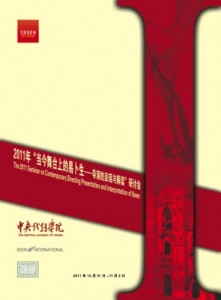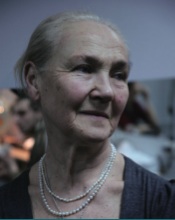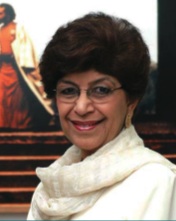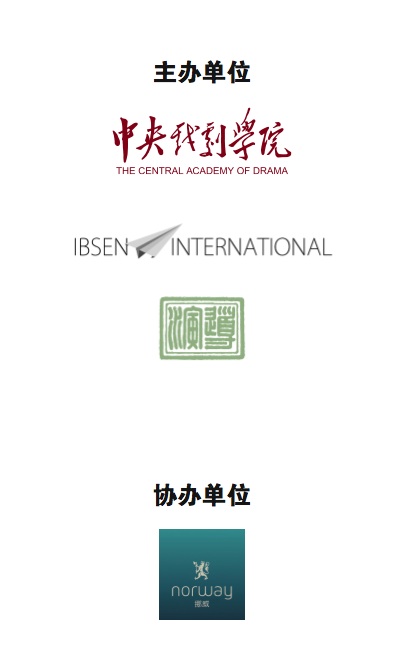-
Calendar 2026
Calendar 2025
Calendar 2024
Calendar 2023
Calendar 2022
Calendar 2021
Calendar 2020
-
Children of Ginko – Preview
31 October, Shanghai
-
Children of Ginko – Premiere
7-8 November, Shanghai,
Calendar 2019
-
Dance Dramaturgy 2.1
23-23 April, Aosai Space, Dali
-
New Text New Stage – “A Deal” Australian Premiere
23-31 August, Sydney
Calendar 2018
-
Web Traffic — A Multimedia Dance Theatre
Jan.5-7th , Shanghai International Dance Center
-
China ComingOUT – Creative Writing for LGBTQ Youth
31st Jan.-4th Feb. , Destination, Beijing.
-
SPEAK OUT: #1 LGBTQ&Perfromance BJ
7th, April , Italian Institute of Culture, Beijing
-
SPEAK OUT: #2 Performance&Performativity
8th, April , Xiaozhong Bookstore, Beijing
-
SPEAK OUT: #1 LGBTQ&Perfromance SH
10th, April , NEXTMIXING, Shanghai
-
SPEAK OUT: #1 LGBTQ&Perfromance GZ
12th, April , Ergao Dance Production Group, Guangzhou
-
SPEAK OUT : #3 Gender, Documentary and Activism
19th, May, Bookworm, Beijing
-
China ComingOUT – Creative Writing for LGBTQ Youth
23rd, May-26th, May , Zizai Studio, Shanghai
-
LookOUT- Arts Festival on Gender
July 6-15, 2018, Beijing, 798 Art District
-
Let You Be rerun in Beijing Penghao Theatre
26-27th, July , Penghao Theatre, Beijing
-
I Disappear Premiere in Beijing
28th, 29th, July , Penghao Theatre, Beijing
-
Dance Dramaturgy Workshop I
27th,Aug.-2nd, Sep., Free Theatre Alliance Rehearsal Center, Beijing
-
China ComingOUT——Creative Writing for LGBTQ Youth
25th-28th, October , There Art Center, Guangzhou
-
Dance Dramaturgy Workshop II
30th, Oct.-1st, Nov. , Free Theatre Alliance Rehearsal Center
-
MOVING WOR(L)DS – International forum on theatre & migration
7-17th December , Nanjing University, Nanjing, Jiangsu Province, China
Calendar 2017
-
“When Swallows Cry” South African Premiere Reviews
January, Market Theatre Complex, Newtown Johannesburg Gauteng South Africa
-
Frozen Songs Excerpts Presented at Shanghai Project Chapter 2 Opening
April , Shanghai Himalayas Museum
-
The Returning/ Winterreise with Chinese Cast Premiere in Shanghai
21st-23th, July, Shanghai Huangpu Theatre; 28th-29th, July, Penghao Theatre Beijing
-
I Disappear Stage Reading in Penghao Theatre Beijing
July 26th, 14:30/19:30 Penghao Theatre
-
Frozen Songs Premiere at The Arctic Theatre
September,7th, Tromsø, Norway, Arctic Theatre(Hålogaland Teater )
-
Disco-Teca at STOFF – Stockholm Fringe Festival
9th, September, Teater Tre, Stockholm, Sweden
-
Let You Be Premiere in Beijing
September, 25th-26th, 7:30pm Qinglan Theatre
-
Let You Be Tour in Hangzhou Contemporary Theatre Festival
28th, September, Zhejiang Province Culture Center Small Theatre.
-
Disco-Teca at We Festival of Future Shanghai
October, 7th-8th, No.6 Space, West Bund Camp 3399, Shanghai
-
New Text New Stage II Tatarstan Production Premiere
14th, 15th, 17th, October, 2017, Galiaskar Kamal Tatar National Academic Theatre, Tatarstan
-
New Text New Stage II Chinese/American Production Coming Up
Nov 15th-Dec.10th, Urban Stages Theatre, New York. Sep.24th-30th, Nanjing University, Jiangsu, China.
-
About My Parents and Their Child Touring in Shanghai
December, 9th-10th, Shanghai Dramatic Art Center 1933 Micro Theatre.
-
Contextualizing Dance Dramaturgy – Workshop Series BJ
Dec. 22nd , Goethe Institut China, Beijing
-
Contextualizing Dance Dramaturgy – Workshop Series GZ
Dec. 25th , Ergao Dance Production Group, Guangzhou
-
Contextualizing Dance Dramaturgy – Workshop Series SH
Dec. 30th , Camp 3399 #6 Space, Shanghai
Calendar 2016
-
Night Shift, Beijing rerun
8-9 January, Qinglan theatre, Beijing
-
Ghost 2.0, Beijing rerun
21st-24th, Jan. , Beijing Tianqiao Performing Arts Center
-
SEEDS – A Global Art and Media Project
1-11th, March, Drum Tower West Theatre, Beijing, China
-
Sleeping Beauties—Dancing & Multimedia Workshop Demonstration
6th, March, Drum Tower West Theatre, BJ
-
NEW TEXT, NEW STAGE II – Session 3
20th-26th, March , Guangzhou Dramatic Art Center. There Art Space in GZ
-
Free Theater Alliance – Launch of 1-2-3 Theatre
April, 18th, Qinglan Theater, Beijing
-
Jon Fosse’s Dream of Autumn BOOK LAUNCH
23 April, JEWELVARY Art & Boutique
-
PRACTICAL RETHORIC Workshop (SH)
6月19日, Internet Education Plaza, Shanghai
-
PRACTICAL RETHORIC Open Demonstration (GZ)
July 2, There Art Space, Guangzhou
-
Disco-teca Open Presentation (GZ)
July 9, Guangdong Times Museum, Guangzhou
-
PRACTICAL RETHORIC Open Demonstration(SH)
July 10, RSDBT. Shanghai
-
DISCO-TECA in Shanghai
July 12-13, 1933 Micro Theatre
-
Disco-teca Open Presentation (SH)
July 15, RSDBT, Shanghai
-
In the Field of Hope
July 18-19, Gulou West Theatre
-
About My Parent and Their Child
July23-24, Gulou West Theater · Beijing
-
DISCO-TECA in Beijing
July 23-24, Gulou West Theatre
-
Ghost 2.0 at Wuzhen Theatre Festival
13th, 14th October , Wuzhen, China
-
Workshop by Jon Tombre
12th-13th, November, FTA Rehearsal Space, Beijing
Calendar 2015
-
Practical Rhetoric – Workshop 1
13-18 March, Beijing, Here&Now Studio
-
New Takes on IBSEN
April, 22nd-26th, Shanghai, China
-
Ibsen in One Take – Shanghai 2015
23-24 April, Himalaya Center, Shanghai
-
Night Shift – Norwegian Tour
May 27, 30, Lilehammer, Oslo
-
Practical Rhetoric – Workshop 2
24-28 June, Beijing, Here&Now Studio
-
NEW TEXT, NEW STAGE II – Session 1
13-18 July 2015, Pioneer Theatre, Beijing
-
GHOSTS 2.0
7-9 August, McaM Museum, Shanghai
-
Comedy of Love, Premiere
30th, Sept.-4th, Oct., Penghao Theater, BJ
-
Practical Rhetoric – Workshop 3
3-7 October, Here&Now Studio, Beijing
-
Workshop on Jon Fosse
Oct. 5th-10th , Sheung Wan Municipal Services Building, HK
-
Practical Rhetoric: Launch at Norwegian Embassy
8 October, Norwegian Embassy, Beijing
-
DISCO-TECA, open workshops
10-14 October, Guangzhou
-
Practical Rhetoric:Workshop at Bernard Controls
10 October, Bernard Controls China, Beijing
-
NORA – Norwegian Tour 2015
October 28 - November 3, Bodø; Tromsø; Trondheim
-
DISCO-TECA, premiere
4-5 November, Gender Bender Festival, Bologna
-
Night Shift Guangzhou Tour
13-15th, November, Guangzhou Dramatic Art Center
-
NEW TEXT, NEW STAGE II – Session 2
Nov. 15th-22nd, Shanghai Ming Contemporary Museum, Shanghai Dramatic Art Center
-
Night Shift Shanghai Tour
21-22, November , Shanghai Dramatic Art Center
-
DISCO-TECA: live performances & media feedback
December, 17th, DPAC, Malaysia
Calendar 2014
-
Artists’ Talk Series 1: Architecture and Scenography
January 21 - 27th, Ibsen International Office, Beijing
-
Artists’ Talk Series 1: New Media and Theatre
29th March, Ibsen International Office, Beijing
-
New Texts, New Stage – Session 3
5th - 10th May 2014, Pioneer Theatre, Beijing
-
HEDVIG from the Wild Duck – Oslo
14-16th August, Oslo Opera House, Norway
-
GHOSTS 2.0
6-7 September, Beehive theatre, Beijing
-
Artists’ Talk Series 1: Drama, Communication and Society
7th September, Ibsen International Office, Beijing
-
Ibsen in One Take – Ibsen Festival Oslo
12th September, Oslo,
-
Night Shift – Beijing Fringe Festival
16th-17th September, Beijing Fringe Festival
-
Ibsen in One Take – OzAsia Festival
16-17th September, Adelaide,
-
The phenomenon: Hedda Gabler
11th-12th October, Penghao Theatre, Beijing
-
Night Shift – Beijing Rerun
13th October, Gulou West Theatre. Beijing
-
NORA – World premiere
30-31 October, Tianjin Grand Theatre, Tianjin
-
Jo Strømgren Kompanis at Guandong Modern Dance Festival
November 10-12,2014, Xinghai PA Garden,Guang Zhou, China
-
Jon Fosse’s Blossoms In Shanghai International Contemporary Theatre Festival 2014
November 21-29,2014, Shanghai Dramatic Arts Centre, China
Calendar 2013
-
New Texts, New Stage – Session1
16th - 20th April, Star Theatre, Beijing
-
HEDVIG from the Wild Duck
28-29th June, Kwai Tsing Theatre Auditorium, Hong Kong
-
HEDVIG from the Wild Duck – Beijing
23rd July, People Liberation's Army Theatre, Beijing
-
Carcass
26th July 2013, Star Theatre, Beijing
-
Ibsen in One Take – Netherlands
27 - 28th September, Rotterdam
-
Ibsen in One Take – China tour
13 - 16 November, Guangzhou and Shanghai
-
New Texts, New Stage – Session2
23rd November - 1st December, Penghao Theatre, Beijing
-
The Name – Jon Fosse
28 November - 15 December, Shanghai
Calendar 2012
-
The Jon Fosse Project in China
-
The Name
7-11 March, 2012, New Space Theatre, Shanghai
-
Dance Workshop in Beijing with Johannessen for LDTX
13 - 25 April 2012, Beijing
-
Writing Text for Opera
October 11th - 13th 2012, Bergen
-
Field Works
November 22nd - 30th, Macau, Guangzhou, Shenzhen
-
Ibsen in one take
28th November - 1st December, Beijing
-
RETURN _ a devised dance piece
27th November - 6th December, Guangzhou Modern Dance Festival; Singapore Connect Festival.
Calendar 2011
-
Workshop collaboration
23-24 April, Tianqiao Theatre Beijing
-
Masterclass by choreographer Ingun Bjørnsgaard
25 July, Guangzhou
-
Building International Network – seminar Guangdong Moderne Dance Festival
26 July at 11.00, Guangzhou
-
The Name by Jon Fosse, production The New Norwegian Theatre
23 September at 19.15, Venue: The New Stage at Shanghai Theatre Academy, 630 Huashan Rd, Shanghai
-
The Name by Jo Fosse, production The New Norwegian Theatre
24 September at 15 and 19.15, Venue: The New Stage at Shanghai Theatre Academy, 630 Huashan Rd, Shanghai
-
The second Ibsen Festival for Students in China
21 – 23 October, Nanjing
-
The Jon Fosse Project in China
November 4, 2011, 20:00 , The New Space at Shanghai Theatre Acedemy, 630 Huashan Rd., Shanghai, in collaboration with TTS Group
-
International Seminar: Staging Ibsen Today
31 October – 4 November, Beijing
Calendar 2010
-
Ibsen live in China – an exhibition
5 October - 4 November, Hangzhou, Shanghai, Nanjing and Beijing
-
The Lady From the Sea
5 and 6 October 2010, Hangzhou
-
The Lady From the Sea
14 and 15 October, Yi Fu Stage, Shanghai
-
Symposium on Ibsen and Interculturalism in China
15 October, Shanghai Theatre Academy
-
A Doll’s House
22, 23 and 24 October, Capital Theatre, Beijing
-
China International Ibsen Festival for Students
22, 23 and 24 October, Nanjing University
-
Workshop based on Jon Fosse’s work
25 - 29 October, Shanghai Theatre Academy
-
Someone Is Going to Come by Jon Fosse
26 October to 4 November 2010, New Theatre Stage, Shanghai Theatre Academy
-
International Seminar: Staging Ibsen Today

The seminar “Staging Ibsen Today” was conducted at the Central Academy of Drama in Beijing 31 October – 4 November 2011. Theatre makers from China, Russia, Brazil, India, and Norway shared their experiences and thoughts on staging Ibsen in their respective countries with an eager and inspired audience of students and professors. The seminar also resulted in a strong bond between the invited speakers and the Chinese hosts through the signing of the BRINCS agreement.
Opening statement by Wang Xiaoying
Supervisor at the Chinese Dramatist Association,Theatre Directing Committee
Welcome to Beijing, our friends from Norway, Russia, Brazil, India and other countries! We, the Directing Art Committee of the Chinese Dramatists Association, would like to extend our warm greetings to you, we are pleased to have you here together with the Chinese dramatists and scholars for the international seminar on “Contemporary Presentation and Interpretation on Ibsen” in honor of the great playwright, Ibsen.
Without doubt, Shakespeare is the most well-known foreign playwright in China, while Ibsen gives us the most profound influence on the development of Chinese dramas. Ibsen has been playing a significant role in many aspects, such as Chinese dramaturgy and performing art, emergency of China’s greatest dramatists, Chinese practitioners’ understanding and appreciation on dramatic functions and the development of theatrical ideas and even the definition of “drama” in Chinese. Some of his influence lasts to this day.
For a long time, the interpretation and presentation of Ibsen’s works was confined to realism and social problems by the Chinese dramatists to a great extent. Ever since the early 1980s, starting with the staging of Ibsen’s dramas like Peer Gynt, The Master Builder, and A Doll’s House, Pillars of Society, and Ghosts in many different versions, the Chinese dramatists have developed a deeper understanding of the practical knowledge about Ibsen’s poetic, rhapsodic, and metaphorical expression in his dramas. With more and more modern interpretation and international cooperation in recent years, it has been highly raised that Ibsen’s dramas have great vitality and diverse ways
of interpretation on the stage. All of these performances engage us in self-examination about whether the Chinese dramatists’ understanding of Ibsen’s “social dramas” is superficial? Ibsen’s dramas remain an enduring popularity in every corner of the globe for over 100 years, is it because the social criticism or the spirit inspired by the characters’ pursuit of personality freedom? Such questions may also enlighten us in the aspect of dramatic creation. Perhaps it is fair to say that a deeper and more thorough understanding of Ibsen’s dramas is in a way a deeper and more thorough understanding of dramatic art itself. To conclude, may the international seminar on “Contemporary Presentation and Interpretation on Ibsen” a great and complete success!
Opening Statement by Inger Buresund
Artistic and Managing Director Ibsen International
I have had the great pleasure to see Ibsen’s plays in many different cultures and contexts. Most of the times the play appears like it belongs in the country’s culture and certainly is recognizable as Ibsen’s text. Ibsen can probably be adapted to any culture. His themes are becoming more and more important and are modern issues. I often get the question: As Norwegian, please explain to us the real way of staging Ibsen? The answer to that is: If there was one way of staging Ibsen, the Norwegian way, Ibsen wouldn’t be world famous. There isn’t even one Norwegian way of staging him.
Ibsen International is proud and honored to partner with The Central Academy of Drama in China and China Theatre Association Directing Arts Committee for the seminar. We have invited keynote speakers from Brazil, Russia, India, China and Norway to present their experience of staging Ibsen today. This seminar is a rare opportunity to gain insight from directors’, from very different countries and cultures, work with Ibsen to day. This is what the seminar Staging Ibsen Today will focus on. I look forward to exciting presentations, intense dialogue and not least the beginning of cooperation with directors from some of the most important countries today.
Speakers:

Wu Xiaojiang (China)
Director of National Theatre of China
Guest professor of the Central Academy of Drama
National First-grade Director
His hometown is Zhongshan of Guangdong. In October 7th, 1953, he was born in
Shanghai, China. He went to Longzhen Farm in Heilongjiang in 1970s and served
as agricultural workers. In 1977, he studied at Harbin Drama Theatre as an actor. In
1979, he became a student of department of directing in Central Academy of Drama
and graduated from there in 1984 with the degree of bachelor. In 1984, he served as a
director of the Central Experimental Theatre of China.
Wu Xiaojiang has directed and participated in the performance of three Ibsen dramas
in China, which are An Enemy of the People staged at Central Experimental Drama
Theater, A Doll’s House staged at Central Experimental Drama Theater, and Hedda
(Hedda Gabler) staged at Shanghai Theatre Academy. He also contributed to the
performance of Peer Gynt, a graduation work by the undergraduate students (Class of
1979) of the Department of Directing. He has attended the International Ibsen Seminars
held in Norway and China for several times, and published related papers.

Tania Pires (Brazil)
Actress and Cultural Producer
• Graduated in Theater (1989) and Culture Management (2008) in Rio de Janeiro, Brazil;
• Has been acting in a number of plays in Brazil for 22 years;
• Started a Cultural Production and Management company in Rio, TALU Productions, in
2003 and have been producing plays, shows and festivals since then;
• In 2006 produced and starred in “The Little Eyolf”, by Ibsen, which was on tour in Brazil
for 2 years. The play was selected to the Ibsen Festival in Oslo to represent Brazil.
• Created and produced the “Ibsen Festival” in Brazil in 2006, paying a tribute to Ibsen’s
centennial;
• In 2008 created and produced FESTLIP, an international Theater Festival with
participants from the eight CPLP (The Community of Portuguese-Speaking countries)
representatives: Portugal, Brazil, Mozambique, Angola, East Timor, Guinea-Bissau, San
Tome and Principe, Cape Verde. The Festival is preparing its 5th edition for 2012;
• Tânia has been invited by the Brazilian Federal Government to represent the cultural
area in the I CPLP Forum, to be held in Brazil in September, 2011;
• Toured all CPLP countries in 2009 organizing theater workshops based on Ibsen’s
dramaturgy , lecturing and teaching theater classes. More than 1.500 theater
professionals from all these countries were involved in this project;
• In 2009 was invited to participate in the “Theater Interchange Policies in CPLP
countries”, held in Coimbra, Portugal;

Natalia Somova (Russia)
Painter and Stage Director
Member of the Russian Artists association
Chief artist at the Moscow Drama Theory and Production Center
Member of the Russian Council of Arts Center
Natalia graduated from The Surikov Art Institute and has dedicated herself to both
experimental and traditional arts. While having all kinds of amazing ideas and styles,
she is also known as a unique and original artist. She has attended many international
exhibitions held in Russia, Europe, and Asia. In 1989, she began to hold solo exhibitions
in Russia and foreign countries. The latest was at Moscow Manege International Art
Exhibition in March, 2011.
In May of 2011, as a director and designer, she staged her first piece of theatre works –
Ibsen’s Peer Gynt, produced by Moscow Drama Theory and Production Center.

Amal Allana (India)
Theatre director and teacher
As an outstanding theatre director and teacher, Amal Allana has devoted all her life to
arts and made numerous achievements, which, like aesthetic principles, have produced
influences on every aspect of the social reality. She has made an extraordinarily
careful observation on human existence and combined her personal sympathy and
understanding with the international vision so as to obtain the general experience of
humankind. Inspired by the tradition of international theatre, her works, which seem
quite “Indian” but are truly “International”, have become an inter-cultural practice with
ideas that go beyond cultural and national narrowness and bias.
Since 2005, she has held the post of president of the International Theatre Institute in
New Delhi, head of the performing department in the Theatre Art and Design College,
and art director of a drama company under the Drama TV Association in New Delhi. In
2010, she started to work as chief director of the “Cultural Heritage” simultaneously, a
famous Indian contemporary art gallery.
Amal Allana graduated from the National School of Drama (India), and then
accomplished her internship at Berlin Philharmonic Orchestra and some other
theatres in Germany for two years. So far, she has directed more than 60 stage
shows and numerous TV series. She designed costumes for stage performance and
movies, worked as an exhibition planner, did research and writings about drama, and
participated in many other relevant activities. Meanwhile, she has never stopped her
theatre education in many well-known institutions.
Parts of her stage works: Aadhe Adhure, The Good Person of Setzuan, Khamosh!,
Mahabhoj, King Lear, Himmat Mai, Begum Barve, Erendira & Her Heartless
Grandmother—based on one of Márquez’s short stories, Nati Binodini—based on
the autobiography of Binodini who was an Indian stage performer in the 19th century,
Metropolis—premiered at Ibsen Festival in 2009, based on the Bombay terrorist attack
on November 26, 2008 and adapted Ibsen’s three works, Rosmersholm, Hedda Gabler,
and A Doll’s House.

Yngvar Julin (Norway)
Scenographer and architect
Yngvar graduated in architecture major, and he now works and lives in Oslo of
Norway. His work ranges from architecture design and museum exhibition to
performing arts. In the past 20 years, he has participated in more than 40 pieces
of stage works, which covers modern dances, new operas, as well as traditional
dramas. He used to work in many major theatres in Norway, Sweden, Denmark,
Poland, and Germany.
Yngvar Julin has already cooperated with Ms. Engel, art and management
director of Ibsen International, on some contemporary arts based on Ibsen. They
endowed most of Ibsen’s works, such as A Doll’s House, Rosmersholm, The
Wild Duck, Lady from the Sea, and many other works, with new concepts in an
amazing and surprising way at Norwegian Ibsen Theatre. Many of Julin’s works
have been staged at the Ibsen Theatre Festivals in India, Bengal, and Norway.
